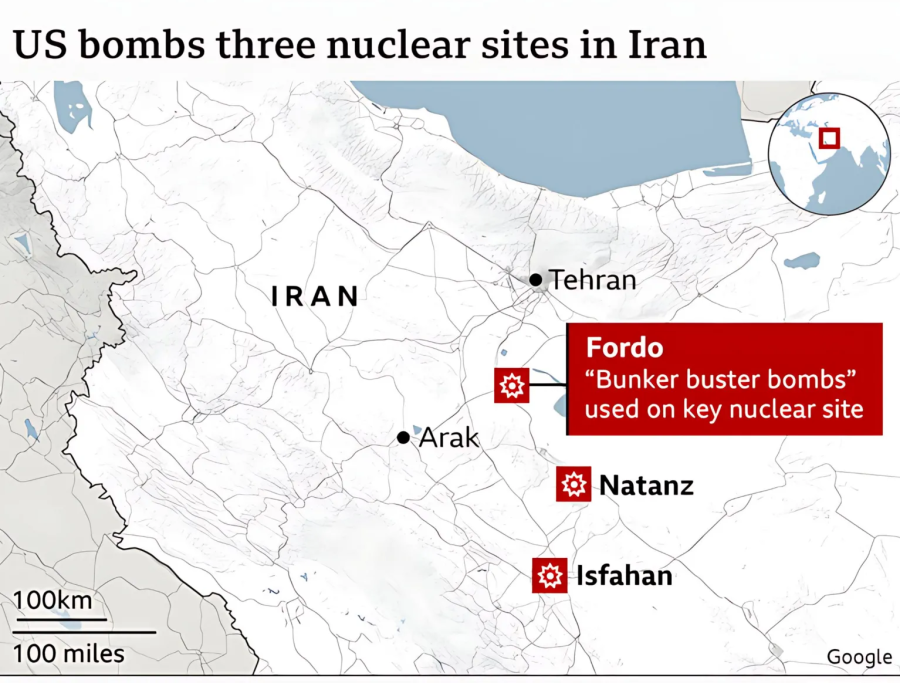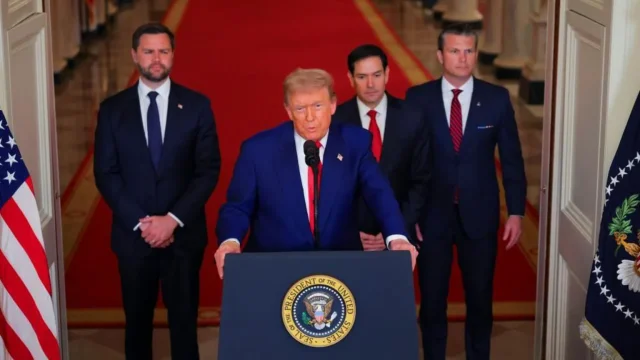WASHINGTON, Sunday, June 22, 2025 (WNP): In a dramatic turn of events, U.S. President Donald J. Trump announced late Saturday that American forces had conducted precision strikes on three nuclear facilities in Iran, marking a sharp escalation in an already volatile Middle East conflict and raising questions over Trump’s self-declared mission as a global “peacemaker.”
In a nationally televised address from the White House, delivered just two hours after the strikes were confirmed via social media, Trump hailed the operation as a “spectacular success.” Flanked by Vice President J.D. Vance, Secretary of State Marco Rubio, and Secretary of Defense Pete Hegseth, he declared the strikes a necessary step to prevent Iran from achieving nuclear weapons capability.
“This action sends a clear message: if Iran does not dismantle its nuclear program, far worse and much faster responses will follow,” Trump warned, adding ominously that “many targets remain.”
The strikes reportedly targeted Iran’s deeply buried Fordo nuclear facility—long regarded as the crown jewel of Tehran’s uranium enrichment infrastructure—alongside two other unspecified sites. While U.S. officials characterized the mission as effective, Iranian authorities claimed only minor damage was inflicted, a discrepancy yet to be verified.

The operation has sparked alarm across the international community. United Nations Secretary-General António Guterres cautioned against a “spiral of chaos,” warning that the region was already on edge and any miscalculation could lead to a broader conflagration.
Iran’s Supreme Leader Ayatollah Ali Khamenei had previously vowed retaliation in the event of a U.S. attack. Whether and how Iran responds in the coming hours or days will likely determine whether the conflict escalates into full-scale war or retreats into uneasy diplomacy.
Critics argue that Trump’s increasingly hardline stance—including a now-controversial demand last week for Iran’s “unconditional surrender”—has backed both Washington and Tehran into dangerous corners with little room for de-escalation.
The timing and intention of the strikes remain unclear. On Thursday, Trump had publicly issued Iran a two-week ultimatum. Yet, just two days later, the missiles were launched. Some observers suspect the earlier deadline was a strategic ruse to catch Tehran off guard; others point to the possible breakdown of behind-the-scenes negotiations led by Trump’s envoy, Steve Witkoff.
Despite the bellicose tone of his address, Trump attempted to cast the strikes as a prelude to peace, saying the goal was to “open the door for negotiations where Iran can choose progress over provocation.”
But analysts warn this may be wishful thinking. Given Iran’s refusal to engage diplomatically amid ongoing Israeli military actions, there is little reason to believe that U.S. airstrikes will compel Tehran to return to the negotiating table. On the contrary, retaliation now appears almost inevitable.
The attack marks a sharp departure from Trump’s campaign pledge to avoid “forever wars” and maintain an America First, non-interventionist foreign policy. It has also exposed divisions within the Republican Party, particularly among Trump’s populist base.
Vice President Vance, a vocal skeptic of foreign entanglements, appeared alongside the president in what many see as a deliberate effort to display party unity. In recent weeks, Vance had used social media to reassure supporters that Trump remained committed to a restrained global posture. Whether that message will continue to resonate after the strikes remains uncertain.
Democratic leaders and anti-war advocates have condemned the move, warning that Trump may have triggered a chain of events that could pull the United States into another prolonged and costly conflict.
For a president who touted his first term as one of peace, Saturday’s strike could be a defining moment of his second. The long-term consequences—diplomatic, military, and political—are now beyond Trump’s complete control.
As regional tensions simmer and the world watches anxiously for Iran’s next move, the stakes have rarely been higher. Whether this was a calculated act of deterrence or a perilous misstep will soon become clear.
One thing is certain: the path to peace in the Middle East just became far more uncertain.




